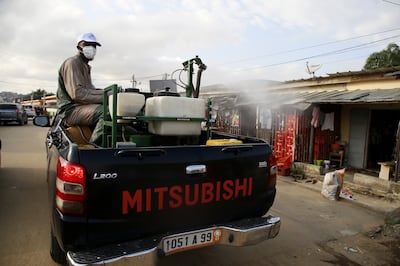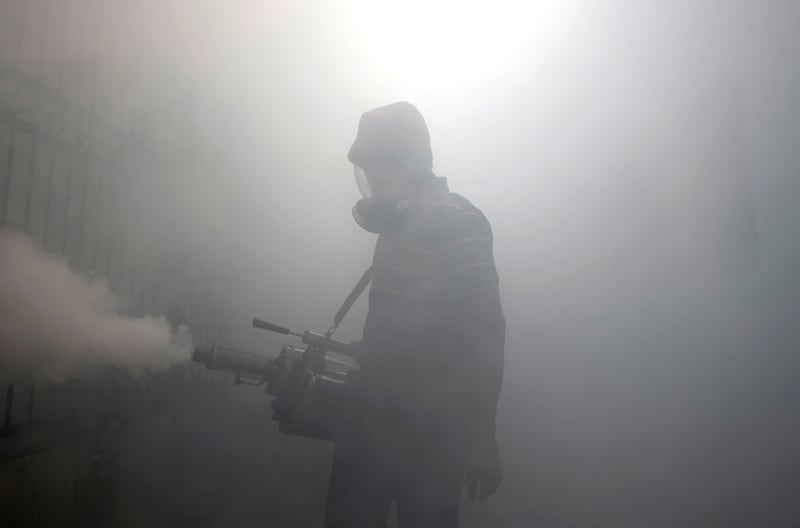Outbreaks of dengue fever have been recorded across the world since the start of the year, prompting the World Health Organisation to issue a warning that cases of the disease could rise to record highs this year.
Rising global temperatures and extreme weather events are set to contribute to more dengue cases, the WHO said.
Since the start of the year, outbreaks of the disease, which is transmitted by the Aedes Aegypti or yellow fever mosquito, have been recorded in Asia and Latin America, as well as in Africa and the Arab world.
“About half of the world's population is at risk of dengue, and dengue affects approximately 129 countries,” said Dr Raman Velayudhan, the WHO’s head of the global programme on control of neglected tropical diseases, at a press briefing on the disease’s spread last week.

"In 2000, we had about half a million cases and in 2022 we recorded over 4.2 million, which really shows an eight-fold increase," he said.
Asia remains the continent with the highest number of dengue cases, accounting for about 70 per cent of the worldwide total, the WHO said.
Dengue is typically endemic to countries with hot, humid climates because they provide the best conditions for mosquitoes to breed, but increasingly, cases have been found in the Middle East despite the arid conditions.
An outbreak of dengue fever was reported this month in Egypt’s southern Qena province after an undisclosed number of people tested positive, the country’s Health Ministry said in a statement.
No deaths were reported and most of the patients received treatment at home. Municipal authorities sprayed insecticides in Qena to kill mosquitoes in the area.
The outbreak came after health officials in Sudan announced the country’s first recorded case of dengue fever in February.
But the regional numbers still pale in comparison to the scale of outbreaks in Asia.
This year, Bangladesh recorded its highest number of cases in five years, more than 22,000, with 114 deaths, 24 of whom were children.
Thailand also recorded 36,000 cases this year, four times the number in 2022.
An increase in cases has also been recorded in Malaysia, a 149 per cent rise compared to last year and for Cambodia this year, double last year's figures.
Though they don’t typically record as many cases of dengue as Asia and Latin America, European countries have been on alert since 2010 when more outbreaks of diseases caused by the Aedes mosquito emerged.
The disease is not typically endemic to the Arab world because climate conditions are unfavourable, but still 81 outbreaks have taken place in the Middle East since 1945, according to a research paper from the University of Heidelberg in 2016.
Sudan has been identified by the US Centres for Disease Control and Prevention as a high-risk country for the disease regionally but Saudi Arabia has also been affected by outbreaks in recent years.
Large immigrant workforces from dengue-endemic countries in addition to the yearly arrival of pilgrims for Hajj are most likely why the disease has broken out in Saudi Arabia despite the unfavourable environment.
Saudi Arabia's Ministry of Health advises that people "coming for Umrah, Hajj, seasonal work or any other purpose in the Hajj areas are advised to take the necessary measures and precautions including trying to avoid mosquito bites, use protective clothing, covering as much of the body as possible and using insect repellent".
Globally, there has been a 30-fold increase in dengue fever cases over the past 50 years, the WHO said on Friday, warning that half the world’s population is at risk of infection.
Though the WHO has said global warming is the main driving force behind the worldwide increase, it added that other factors, such as the increased movement of people and goods, urbanisation and pressure on water and sanitation, have also played a role.
Those infected are usually given medication for pain and fever relief.
There is currently one vaccine for the disease, according to Dr Velayudhan, but “it has certain limitations”.
Two medicines have entered clinical trials, as have two new vaccine candidates. Dengue fever has a death rate of about 1 per cent.







